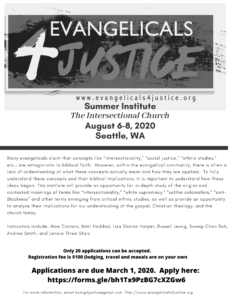Recognizing Nationalism by Andrew Cheung
- Evangelicals 4 Justice
- Apr, 14, 2022
- Uncategorized
- No Comments
National pride has been elusive for me. I was born in America and raised in Canada by ethnic
Chinese parents from Hong Kong, and I recently returned to live in America. Picking a country
to side with in the Olympics has always been a conundrum. I could have my pick of four
countries/territories without feeling any significant emotion towards any one country in particular.
But having just returned from my first trip to Israel-Palestine just as Russia began engaging in
its “special military operation” in Ukraine, I found myself compelled to explore the idea of
national pride, and its correlated effects on nationalism. In the news, nationalism seemed to be
associated with something sinister. As a Jesus-follower, what might be a faithful response to
nationalism? The Britannica website defines nationalism as: “[an] ideology based on the
premise that the individual’s loyalty and devotion to the nation-state surpass other individual or
group interests.”
According to their article, nationalism is a relatively modern movement, precipitated by the
French and American Revolutions in the 18th century. Since then, modern nationalism links a
political state to a particular group of people by defining who’s in and who’s out according to the
definitions of the political state. Benedict Anderson, author of Imagined Communities, adds that
the rise of nationalism was further assisted by the rise of popular publications in vernacular
language targeting a desired people group. It is challenges like these that lie behind the
Israel-Palestine situation and Russia’s claim on Ukraine. Prior to modern nationalism, this sort of
tribal loyalty was built around one’s family and land, a city-state, or a feudal lord. And now, those
who have no nation-state to call their own (i.e. the Hmong and the Rohingya people groups,
among many) can find themselves stateless, voiceless and homeless.
This brings us to what Scripture might have to say about nationalism. As followers of Christ, we
may recall Jesus prioritizing his new family in God (Mark 3:35) when he is told that his family
members are looking for him. We also may recall Jesus’ seeming ambivalence towards the
political nation-state in his response to a question about taxes (Matthew 22:21) and the desire of
his followers for him to “restore the kingdom to Israel” (Acts 1:6). The apostle John helps us see
a vision of the future city whose light all nations gather under (Revelations 21:23-24).
Throughout Jesus’ ministry, we also see Jesus’ concern for the poor and the dispossessed,
whether their condition is caused by physical, social or spiritual reasons. The apostle Peter
reminds his hearers about their new “tribal” identity centered as God’s chosen people (1 Peter
2:9-10), a title formerly reserved for descendants of Abraham.
As we follow the narrative arc Scripture, it would seem that for those who profess to follow
Christ, we have been joined to a new family and a new people group. This new community is
one that doesn’t require defining who’s “in” at the expense of who is “out” because the basis of
our citizenship is grounded in a Person, not a human ideology. This new identity in God’s
kingdom takes precedence and offers a more complete sense of belonging than what
nation-state or tribal identities may offer.
So as followers of Christ, here are five questions that may help us recognize nationalist compulsions at work in our lives and in our “tribes,” whether those tribes are nation-states, people groups, or particular communities:
1 Who gets to define who is “in”?
2 Why is it important to those defining who’s “in?” What’s at stake for them?
3 What popular vernacular or code-words are used to signal belonging to a particular group or exclusion of another group?
4 Who must lose or be overlooked in order for “us” to win?
5 How does our belonging to God’s new community in Christ speak to the fears and insecurities expressed by “our tribe?”
As followers of Jesus live out our belonging as God’s people, perhaps the desire to belong to an earthly tribe (and the need to cheer for a team in the Olympics) doesn’t seem as vital as it is often made out to be. In Christ, we are no longer truly stateless, homeless and voiceless. We simply belong.
Follow us on Twitter: @Evang4Justice
Invalid or expired token.Summer Institute

Recent Posts
- Evangelical Perspectives on Israel and Palestine – by Rob Dalrymple
- Indigenous Peoples and Christian Nationalism by Lenore Three Stars
- Recognizing Nationalism by Andrew Cheung
- Ukraine: “Wars and rumors of wars”: a sign of the times, or a sign of all times? A Christian response by Rob Dalrymple
- E4J Annual Zoom Conference: From Conflict to Community, Feb 11-12, 2022